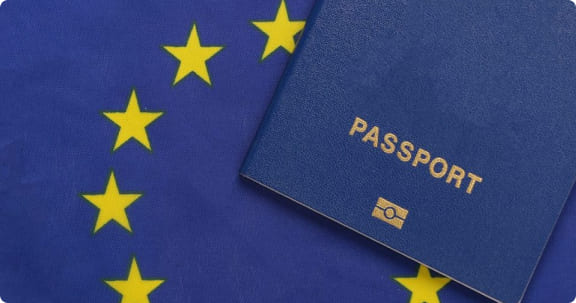What are ETIAS requirements?
Learn the ETIAS requirements for obtaining a travel permit to Europe. Learn about eligible countries exempt from visa rules and how you can apply.

Get notified when ETIAS is mandatory

Start ETIAS Application online

Receive ETIAS confirmation

Welcome to Europe
ETIAS Visa requirements
ETIAS stands for Europe Travel Information and Authorization System. The EU felt the need to increase safety after terrorist attacks. ETIAS was created to improve security in the region for both locals and tourists.
The European Council believes that the new migration and border policy will improve security and protect Europe against any future threats. ETIAS is designed to enhance mobility and migration for foreign visitors.
According to the ETIAS proposal for the EU, 59 countries will be eligible for the visa waiver program. ETIAS visa waivers are travel authorizations for touristic or business purposes. They cannot be used as a substitute for student or working visas.
Third-country nationals who want to stay, study, work, or live in Europe for more than 90 days must apply for the appropriate visa. To be eligible for the visa waiver, applicants must meet the ETIAS requirements. The rules are the same for everyone. It means that the ETIAS requirements for US citizens are the same as for UK citizens.
Visitors must have a passport issued by an ETIAS-eligible country to qualify for the visa waiver. As of 2022, the following ETIAS-eligible countries will be required to apply for the European Visa Waiver.re traveling to any Schengen member country.

ETIAS Eligible Countries
 Albania
Albania Antigua & Barbuda
Antigua & Barbuda Argentina
Argentina Australia
Australia Bahamas
Bahamas Barbados
Barbados Bosnia and Herzegovina
Bosnia and Herzegovina Brazil
Brazil Brunei
Brunei Canada
Canada Chile
Chile Colombia
Colombia
 Costa Rica
Costa Rica Dominica
Dominica El Salvador
El Salvador Georgia
Georgia Granada
Granada Guatemala
Guatemala Honduras
Honduras Hong Kong
Hong Kong Israel
Israel Japan
Japan Kiribati
Kiribati Macao
Macao
 North Macedonia
North Macedonia Malaysia
Malaysia Marshall Islands
Marshall Islands Mauritius
Mauritius Mexico
Mexico Micronesia
Micronesia Moldova
Moldova Montenegro
Montenegro New Zealand
New Zealand Nicaragua
Nicaragua Palau
Palau Panama
Panama
 Paraguay
Paraguay Peru
Peru Saint Kitts & Nevis
Saint Kitts & Nevis Saint Lucia
Saint Lucia Saint Vincent
Saint Vincent Samoa
Samoa Serbia
Serbia Seychelles
Seychelles Singapore
Singapore Solomon Islands
Solomon Islands South Korea
South Korea Taiwan
Taiwan
 Timor Leste
Timor Leste Tonga
Tonga Trinidad and Tobago
Trinidad and Tobago Tuvalu
Tuvalu Uruguay
Uruguay Ukraine
Ukraine
 UAE
UAE Vanuatu
Vanuatu Venezuela
Venezuela United Kingdom
United Kingdom United States
United States
Visa Waiver requirements in the EU
ETIAS application is required to get permission for entry in Europe. ETIAS is like other travel authorization visa waivers: the US ESTA Canada eTA, and Australia eTA.
To complete an application form, applicants must meet the ETIAS requirements. All applicants who plan to travel to Europe must have the required documentation to submit a travel authorization request.
- A passport that has the least validity of three months after the date of your arrival
- Complete payment of the ETIAS application fees for which you will need a debit or credit card
- An email address that is current and where the ETIAS approval will be delivered

The following information will be required of all applicants:
Furthermore, the application will include several security and background eligibility questions that could relate to the traveler’s educational or professional background, past travel history, criminal record, drug abuse, trafficking, terrorism, and others.
The information provided during the application will be checked against several security databases. The databases include Interpol and Europol, along with SIS and VIS. If any information mismatches the database, the applicant will get a rejected visa waiver status.
- First name(s)
- Date of birth
- Surname or family name
- Place of birth
- Country of birth
- Gender
- Name(s) as usual
- Nationality
- Passport number
- Expiration and issuance dates
- If applicable, provide more passport data
- Current address
- Email address
- Telephone number
- Member state of the intended first entry
- Current employment details and education
Security and background questions are part of the application process.
For the family members of EU citizens and third-country nationals who are eligible for travel without the need to have a residence card:
- Please include details about the family relationship between the applicant (EU citizen) and the third-country national (third-country citizen). Third parties can submit applications on behalf of applicants to ETIAS. It will take approximately 10 to 20 minutes per person to complete an ETIAS online request if the traveler meets all ETIAS requirements. There are no other documents required for ETIAS.
Before applying for the Europe visa waiver, please review our list of ETIAS requirements.

Get notified when ETIAS becomes mandatory
Rejected and Annulled ETIAS Applications
Officials will revoke a travel authorization issued by ETIAS if the conditions are not met. ETIAS will be rejected if they provide misleading or fraudulent information.
Applications rejected in the automatic process are transferred to the ETIAS Central Unit at the European Border and Coast Guard. They will verify the application and confirm that the information is accurate and correct. Suspected applications or those that cause an alert or hit will be forwarded to responsible member states.
The ETIAS Information System will be developed by EU-LISA. It is an agency responsible for managing large-scale security information systems. It will also ensure its technical management. The Europol Agency will be responsible for security aspects in the implementation and development stages of the ETIAS program.
1. By identifying persons who pose a security threat before reaching the
Schengen border.
2. By making available information to Europol and national law enforcement authorities, where necessary, in particular cases of investigation, prevention, detection, or investigation of terrorist offenses or other serious criminal offenses.
The applicant can appeal to the member states that denied the ETIAS visa waiver in the event of a denial. The appeal in such cases will fall under the member state’s jurisdiction. There will be an exception procedure in such circumstances, for example, humanitarian grounds or international obligations. ETIAS National Units can issue travel authorizations with limited territorial and temporary validity in these cases.
Suppose the applicant’s information during the application process is insufficient to decide whether to issue the ETIAS travel permit. In that case, the ETIAS National Unit might request more information. ETIAS National Unit will send a detailed request via email for further details.
The applicant will provide this information and/or documentation within seven working days. While, the ETIAS National Unit will take up to 72 hours to process the authorization. An interview may be required for the applicant in exceptional circumstances.
If an applicant cannot satisfy the Schengen visa requirements, the visa will be rejected. It could mean that applicant either could not prove the purpose of the travel, could not provide sufficient travel insurance, couldn’t confirm that they had a place to live, etc. Other reasons may include the criminal record with significant offenses, unacceptable travel history (deports), or invalid documents.
FAQs on ETIAS requirements
Can’t find what you are looking for?
Reach out to our customer support team.
ETIAS will come into full force by the end of 2025. But, it will not be enacted immediately. There will be at least a 6-month transition period during which ETIAS visa waiver will not be mandatory. But, after the transition period, all citizens of the visa-exempt countries to the EU will have to apply for ETIAS.
Tourists with a criminal history of a minor offense can apply for ETIAS. Most likely, they will be granted visa waivers but could need to provide supporting documents or respond to more background questions. ETIAS application will be denied if the applicant has a significant criminal conviction, such as terrorism and other serious offenses.
ETIAS application questions will ask for the personal details, residential address, valid contact details (such as email and phone number), and a valid biometric passport. ETIAS will also ask some background and eligibility questions about employment, education, travel history, criminal record, drug abuse, terrorism, and a few others.